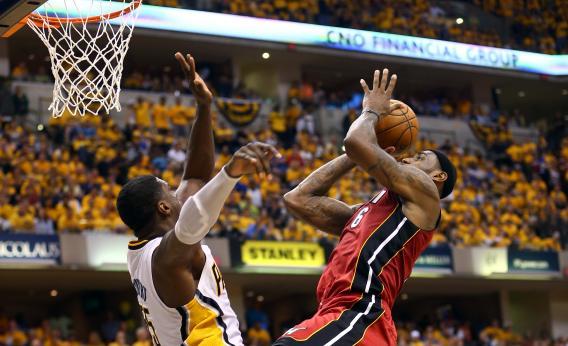Just Undo It: The LeBron James Profile That Nike Killed
Waylan Choy stashed this in That Wasn't the Point
Stashed in: Nike!, LeBron James, Contractual Woes, Publishing, & Media (Industry), Branding, Hard Sell, Reward/Renege, Business as Usual
Hard to believe they were angry with the reporter for writing this:
I asked him if he felt cut off from ordinary life. "Ordinary life?" he said. "Who has the definition for ordinary life? Your life is what you make it—it's how you approach it every day and how you spend that 24-hour block. For me, being with my friends and family, being able to play basketball and travel the world inspiring kids—it's very humbling. Who really knows what an ordinary life is."
There was only one question he answered brusquely and we both knew why. Where do you get your athletic talent from.
"The man above."
I wanted him to tell me about his father, an ex-con who had a one-night stand with his mother when she was 16. So I asked the question another way. "How old were you when you first dunked?"
"Fourteen," he said, for the first time surprising me. I knew kids who could dunk at 14, who ended up nowhere. I myself could dunk a few years later. Fourteen wasn't so young.
Magic Johnson liked to tell a story to explain his success. That he used to shovel snow from his driveway every winter morning, to work on his jump shot. That the difference between him and the rest of us was hard work. It always annoyed me to have him pass off his natural advantages as some kind of dedication. I spent every day after school, come rain or Texas shine, in my backyard shooting hoops. But the truth is, he probably did work harder. LeBron has probably worked harder at his job than anyone I have ever met. Even in Germany in the second division the better players played harder, tried harder than I could—they knew how to try.
"How old were you when you realized you'd be able to make money from basketball?"
"My junior year?" he said. "My senior year?"—another surprise. Local TV started covering his games when he was 14 years old. His high school team had to switch to a university stadium, the crowds got so big. Either he'd forgotten all that or even as a kid he was savvy about the difference between potential and something you can bank on. For his 18th birthday his mom bought him a Hummer H2, taking out a loan against the prospect of his future earnings. There are a couple ways of reading this story. One is to say they needed proof he was going to get paid and went to the bank for it. "It was never a huge thing for me," he told me next, "making money from basketball."
"Magic Johnson, Isaiah Thomas, and Michael Jordan were all asked what they'd do if they weren't basketball players. They all gave very different answers. Magic said he'd work at a gas station. Isiah said he'd probably be a lawyer. Do you have an answer to that question?" Magic was making a comment about class. Thomas wanted to point out his intellectual savvy and combativeness. But LeBron refused to imagine any life but the one he was living.
"I love the game so much that I gave all of my passion to the game when I was 9 years old, so it's hard for me to even think what I would go back and do if I didn't have the game. I know one thing that I love to do, and that's giving back to underprivileged kids. I have the LeBron James Foundation which focuses on helping underprivileged kids and supporting single-parent mothers. I grew up experiencing both of those things—I know with basketball or without basketball I would be doing that."
Some of this sounded true and some of it sounded like publicity, which doesn't mean it wasn't true as well. I'd seen him with those kids after the press conference—he was good at it and looked happy for the first time all day. It occurred to me also that athletes have a different standard of truth from most of us. Maybe for LeBron, for any athlete, something is true when it provokes in you the right response. The mantra definition of truth. Why do you play the game? For love. Are you surprised the Lakers lost to Barcelona? The game starts zero-zero. And so on. Answers that are meant to make you approach your own tasks in the right way.
Afterward, away from his spell, I thought, that's all bullshit. LeBron just beat me at one-on-one. I wanted him to get specific and he stayed general; he won. This impression was reinforced by something Lynn said to me on my way out. "You did well," he said. "The guys approved." At first I felt good; later I realized the implication. That bit about ordinary life? Just look around you. The security, the publicists, the people like me. He's dragged his high school buddies with him around the world. This isn't what you do when you've outgrown your childhood. And then there's the evidence of the games themselves: the strange hesitation at certain crucial moments. His readiness to defer to Wade. Maybe this is what he meant when he said something to me about improving his "leadership."











4:00 PM Jul 13 2014